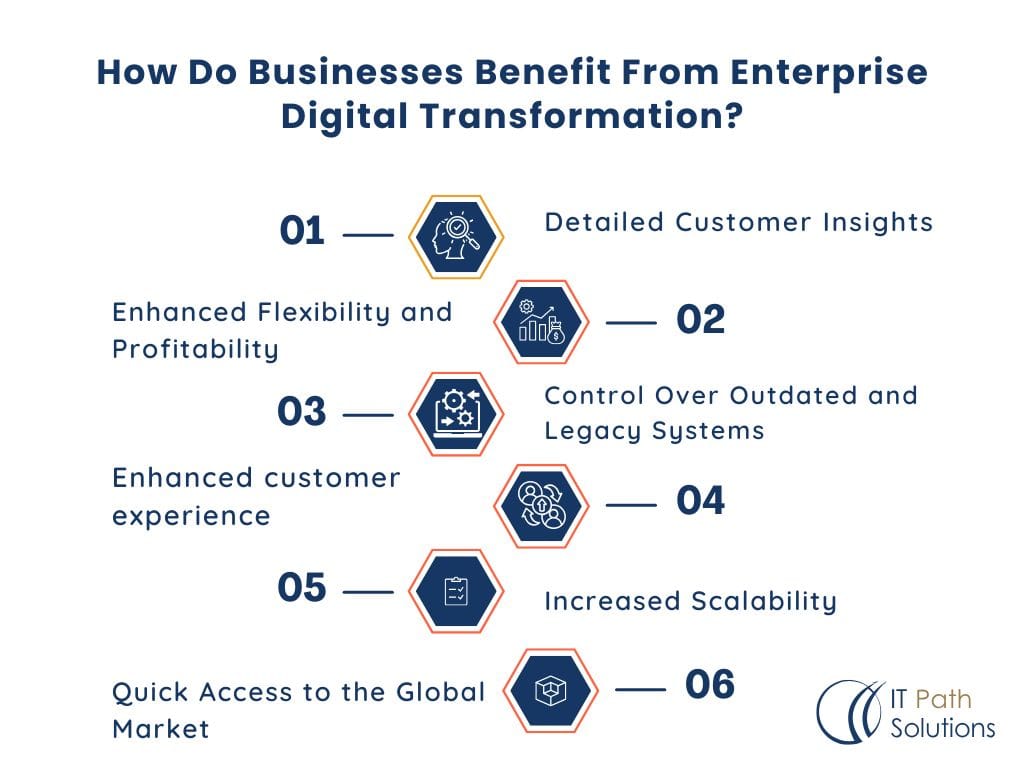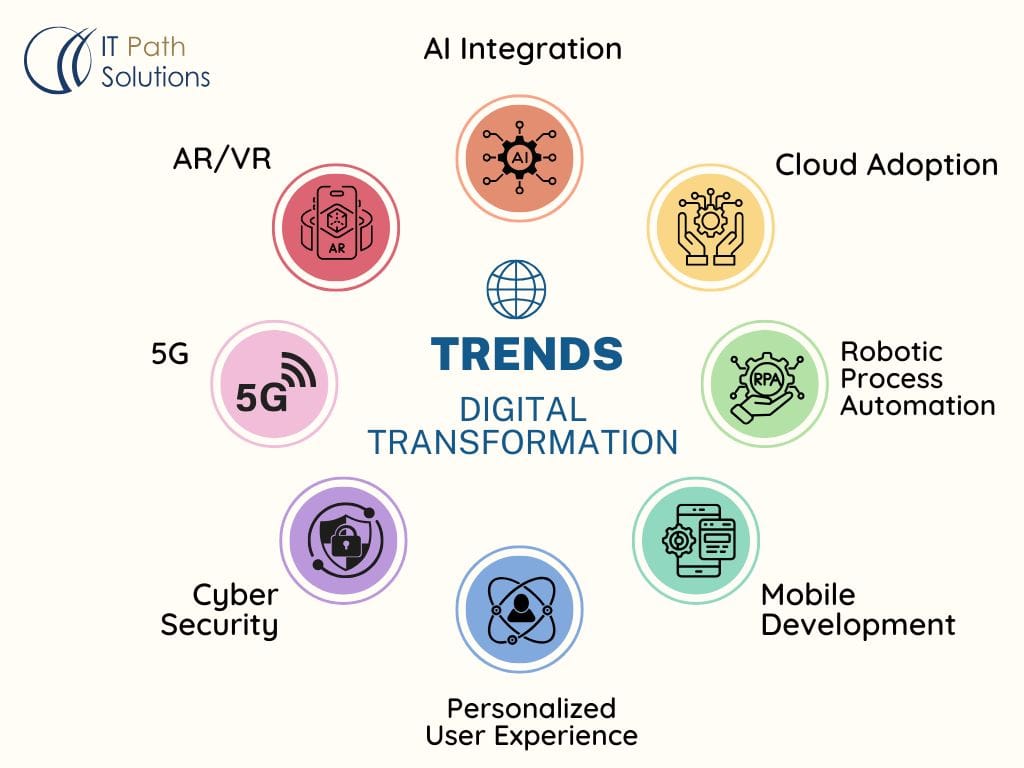What Is Enterprise Digital Transformation And Why Is It Important?
Keyur Patel
September 12, 2025
8 min
Let’s understand how important Digital Transformation is through a case study:
Southwest Airlines had to cancel more than 15000 flights on December 22nd, however, it made arrangements to transfer people the next day, but it had to cancel around 2500 more flights in the coming week. Do you know the reason Why?
The reason was that the airlines were using a decade-old scheduling system, which led to errors and failures in the IT infrastructure. The unmodernized IT systems backlashed, leading to millions of dollars in losses and a negative image in the minds of their customers.
Lesson learned: Upgrading outdated systems is essential for achieving business goals and staying adaptable to the industry’s evolving demands.
One key thing that keeps businesses running is the ability to invest in digital technology and set strategies aligning with digital transformation.
Digital transformation for enterprises can be challenging for large enterprises. As it involves thousands of employees, their capabilities, huge budgets, and more resources. This leap without a doubt can bring in innovation and revenue generation, but taking that first step is always difficult.
In this blog, we will unfold what Enterprise Digital Transformation is and Why is it important in business.
What Is Enterprise Digital Transformation?
Enterprise Digital Transformation is the process of integrating advanced technologies into all business operations. The innovative technologies optimize and manage everyday operations and fuel resources to bring better business outcomes.
Enterprise Digital Transformation brings in more agility and flexibility and streamlines business needs.
Why is Enterprise Digital Transformation Important? 
Digital transformation is a game-changer for enterprises helping them bring improved revenue and making data-driven decisions. Let’s look at the benefits of implementing enterprise digital transformation.
-
Detailed customer insights:
If you are a SaaS enterprise or a huge healthcare provider, you probably are struggling with data handling & management. Now, a lot of this data is unstructured which leads to inaccurate decision making.
With Enterprise Digital Transformation, this business can have access to more relevant customer data, capture insights, and set achievable long-term goals. When these data are structured, by analyzing those data sets effectively, you can deliver customer-centric experiences and thereby increase customer loyalty.
-
Enhanced flexibility and profitability:
Enterprise digital transformation involves uploading data to the cloud. This gives business owners the freedom to access the data and operate as per the demand. The team involved can seamlessly perform remote work without any hassle. The microservice architecture helps break down large applications into smaller pieces, allowing each function to perform independently.
From a financial perspective, businesses do not have to invest in expensive hardware or handle any shipment charges.
-
Control over outdated and legacy systems:
Modernizing digital systems is a must for enterprises. Old systems may cause efficiency-related concerns or integration problems. To avoid facing such backlash, enterprises must introduce digital transformation that helps to automate processes and increase the overall efficiency of the system.
-
Enhanced customer experience:
Data reigns supreme, and Enterprise Digital Transformation empowers you with full control over it. By organizing data effectively, you can gain valuable insights into user behavior, enabling you to personalize customer experiences and enhance customer loyalty.
-
Increased scalability:
Managing huge chunks of data with legacy systems can be challenging. However, with Digital Transformation, businesses can scale their operations and operate without compromising on performance.
-
Quick access to the global market:
Digital transformation opens up the door to new market opportunities. It empowers the workforce and encourages them to adapt to the changing needs. Since the data is available on the cloud, businesses can access it anytime to address any new business chance.
The remote and hybrid working arrangements let you hire a workforce from around the globe who can further take the business to the next level.
Digital transformation sets the stage for the right communications allowing the entire workforce to be on the same table.
What Are The Challenges Related To Enterprise Digital Transformation?
It wouldn’t be true if we say that Digital Transformation comes without roadblocks. It has its own set of challenges that might just block the progress. Let’s look at them.
-
Digital Transformation Planning:
Businesses worldwide are embracing digital transformation to leverage new technologies and meet evolving customer demands. However, successfully executing this transformation requires a well-structured and foolproof strategy with several key considerations.
A comprehensive digital transformation plan should address critical aspects such as the necessity of the transformation, areas that require focus, targeted technologies, potential business benefits, execution and enforcement strategies, and, most importantly, the approach to integrating these changes within the organization. However, developing an effective digital transformation strategy is not always straightforward. Businesses may encounter roadblocks, uncertainties, and skill gaps that can hinder progress.
-
Lack of Adaptability by People:
People are the driving force behind digital transformation. Their focus and adaptability to learn innovative things can bring in successful digital transformation. If they fail or can’t perform their best with the digital technology intervention, you probably might just lose the game.
-
Data Management:
Data migration involves the collection and management of a lot of data. Cleaning it and migrating the data seamlessly can be a bit challenging if not taken care of by the experts.
Also, the security of data is put at risk if any part of the data migration falls out of place. This is why you will need a data management team that ensures compliance with government policies and adherence to security protocols.
-
Cost Management:
Data transformation is a complex and time-consuming project. With a challenging budget, you may find it difficult to implement Enterprise Data Transformation in totality.
What Are The Top Enterprise Digital Transformation Trends To Follow?
Staying updated with the latest trends helps your business stay ahead of the competition. However, while implementing any of the advanced digital transformation trends, enhancing customer and employee experience should be the top priority.

Some of the emerging trends in Enterprise Digital Transformation are:
- AI integration,
- Cloud adoption;
- AR/VR;
- Robotic Process Automation (RPA),
- 5G,
- Mobile development
- And personalized user experience.
How To Know If Your Enterprise Is Ready For Digital Transformation?
Enterprise Digital Transformation is a big decision that is not easy to make. You need the set of right team and people to support you in the process. Here are a few key things that can help you know if your business is ready for digital transformation.
#1 If you are still using email on-premises?
If your business email service is still on-premise, it’s probably time that you consider the big move to digital transformation. You can start with the migration of the telephony to the cloud.
#2 Are you ready for the cloud?
Cloud-based architecture is important for global and cost effective-connectivity. It helps enhance future adaptability, mobility, and versatility. If your business and team are ready for it, you can opt for enterprise digital transformation.
# 3 Does your business support hybrid or remote revolution?
Working 9-5 is a thing of the past. With remote work setup gaining much attention after COVID-19, it is important to provide flexible working options to your employees. By providing a work-from-home facility, you save a huge chunk of money invested on office rent, leases pricey hardware, etc.
What Is The Ideal Enterprise Digital Transformation Strategy?
To implement Digital Transformation in your enterprise you must know what it takes for a full-scale implementation.
Examine your current business status:
Perform a thorough analysis of your existing business setup such as company tools, productivity apps, help desk, etc. Are they all aligned and in the right state to use? If the answer is negative, start focusing on streamlining them.
Define your strategy:
Next, fine-tune your approach by defining key business scenarios, target audiences, objectives, and desired outcomes. Leverage these insights to develop an initial marketing strategy that accounts for all factors influencing your business landscape.
Identify the customer segments and the technologies that will help you engage them effectively. Understand their needs and preferences, ensuring they are seamlessly incorporated into your digital transformation strategy.
Set your KPIs:
For Enterprise Digita Transformation, you need to define your Key Performance Indicators. Tracking these KPIs keeps you informed about the company’s progress and how you can achieve the progress. Here are a few KPIs, that you can start tracking.
- Customer lifetime value
- Time saved
- Earnings from innovative digital services
- Business viability
- Outbound marketing effectiveness
- Operational efficiency
- Productivity of the workforce
- Innovativeness rate
- The rapidity of cloud application deployment
Deploy in Phases:
Divide deployment into phases that are simple and achievable. This helps you decide the speed with which you can cover the rest of the digital transformation. Deploying in phases also lets you know the risk involved with digital transformation. If everything seems clear, you can then perform a full-fledged digital transformation.
Conclusion:
Enterprise Digital Transformation allows your business to be agile and quickly adapt to ever-evolving customer/industry demands. It is here to bring disruption in the way digital data is handled. If you are looking for an Enterprise Digital Transformation partner, we would be happy to help. Get in touch with our team to know more details. Thank you!
Keyur Patel
Co-Founder
Keyur Patel is the director at IT Path Solutions, where he helps businesses develop scalable applications. With his extensive experience and visionary approach, he leads the team to create futuristic solutions. Keyur Patel has exceptional leadership skills and technical expertise in Node.js, .Net, React.js, AI/ML, and PHP frameworks. His dedication to driving digital transformation makes him an invaluable asset to the company.
Get in Touch
Search
Blog Categories
